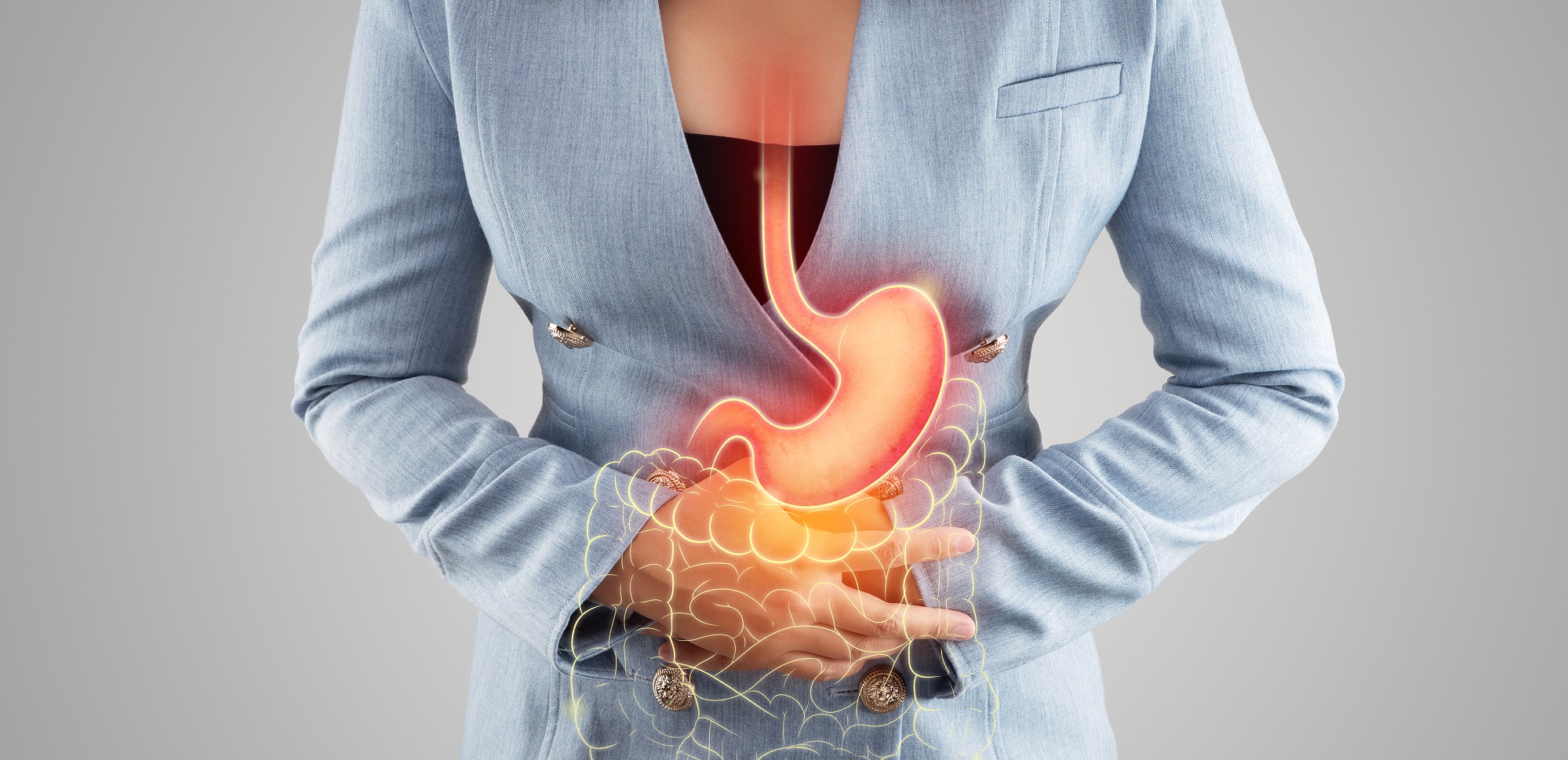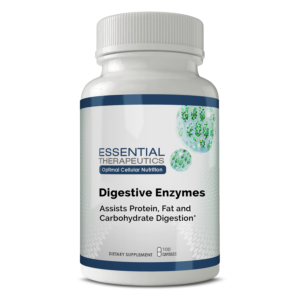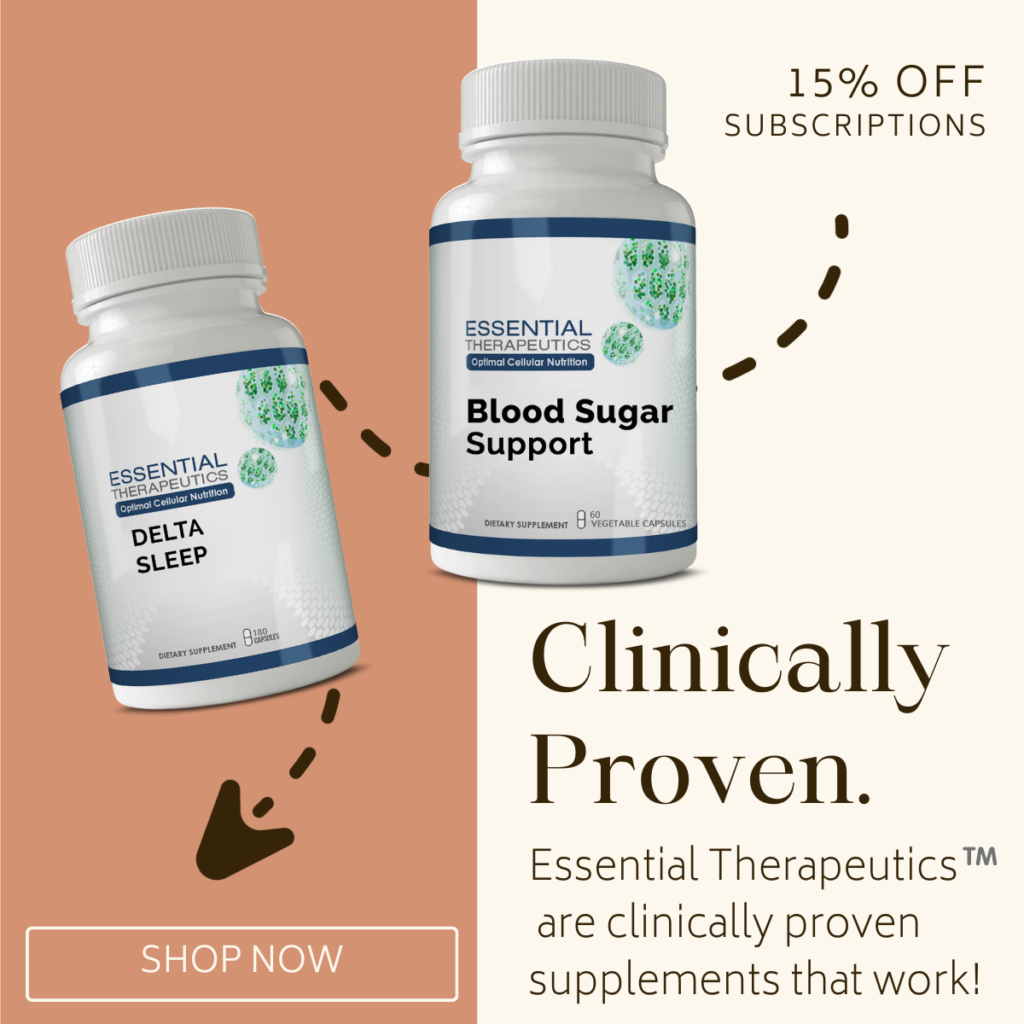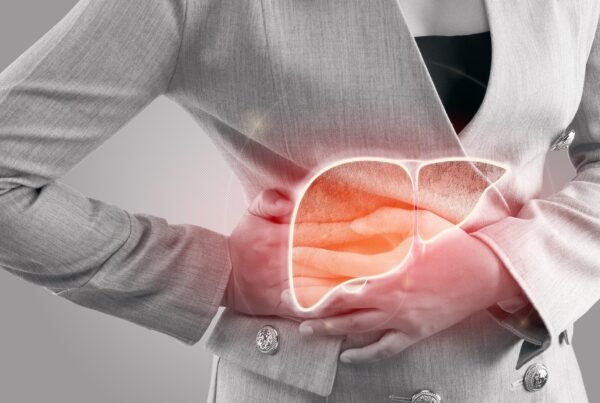Scientists believe that the average person hosts about 500 toxic chemicals in his/her body, mostly within their fat tissues. These toxins may lead to serious health conditions such as infertility, liver damage, diabetes, brain damage, cancer, or death.
Ridding yourself of toxins through a healthy detox diet, combined with the right nutrients can help you:
- Dramatically increase your energy
- Reduce chronic achy pain
- Boost mental clarity
- Lose weight (if needed)
- Eliminate bloating, gas and other GI symptoms
- Remove excess water retention (swollen hands, ankles and feet)
- Have glowing, healthy skin, nails and hair
Step-by-step instructions, presentations, live Q&A sessions and more!
- Easy to follow diet, SAFE, gentle protocols (NO harsh chemicals or supplements, cleanses or purges!).
- By simply changing your diet and adding a couple of inexpensive over the counter supplements (optional), you can dramatically reduce your toxic load.
–> Learn more – Register for FREE HERE
to get information on accessing the FREE Zoom presentation, Q&A’s, handouts, recipes and more!
** If you can’t commit to doing the Detox Diet during the scheduled 2 weeks, simply grab the information and do it at your convenience. **
Register here and get your free registration gifts including, “What You Should Know About Organic Foods” Report
Part 6 Which Diet is Right For You?
The FODMAP Diet
Overview
The FODMAP Diet has been shown to be beneficial for those gastrointestinal complaints, including those with irritable bowel syndrome (IBS).
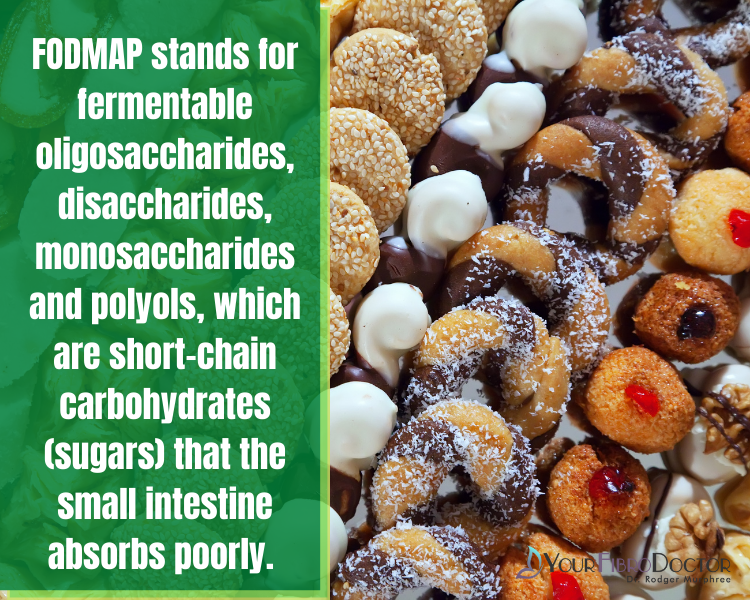
Not only does this diet benefit those with IBS it has proven to be beneficial for other functional gastrointestinal disorders (FGID), which is an umbrella term used to describe a variety of digestive problems including patients with inflammatory bowel diseases, such as ulcerative colitis and Crohn’s disease.
Irritable bowel syndrome, or IBS, is a common medical condition with vague etiologies and pathophysiology. This ailment has no curative treatment and presents with diverse signs and symptoms that go through periods of flare ups and remissions.
For instance, you may experience severe symptoms for one week, then go through a remission period for a month.
According to statistics, the international prevalence of IBS is 11.2%, which is a significant number. However, this number varies in different regions around the globe, where some countries report a prevalence of 7% and others reaching up to 21%.
These reports only emphasize the widespread of IBS and the number of patients affected, which is why we need credible information about IBS and the available treatment options.
Despite the vagueness that surrounds IBS, experts identified the following risk factors:
- Smoking
- Alcohol consumption
- Young age
- Psychological and physical stress
- Imbalanced diet
- Hormonal dysregulation
Fortunately, there seems to be one diet that is particularly effective in improving the symptoms of IBS, as well as indigestion.
In this article, we will cover everything you need to know about the FODMAP diet, including how it helps patients with IBS and its limitations.
What is the FODMAP diet?
The FODMAP diet focuses on limiting/excluding certain food elements from daily intake to prevent the induction of IBS flareups and other symptoms of indigestion.
FODMAP stands for the following:
Fermentable Oligo-, Di-, Mono-Saccharides, and Polyols.
These terms describe a wide range of foods that were shown to cause bloating, gas, and abdominal cramping, which is especially unwanted for patients with IBS.
Here are a few examples of these foods:
- Oligosaccharides: wheat, legumes, fruits, and vegetables (e.g., garlic, onion).
- Disaccharides: milk, soft cheese, yogurt, and all lactose-rich products.
- Monosaccharides: figs, mangoes, honey, and agave nectar.
- Polyols: blackberries, lychee, and low-calorie sweeteners.
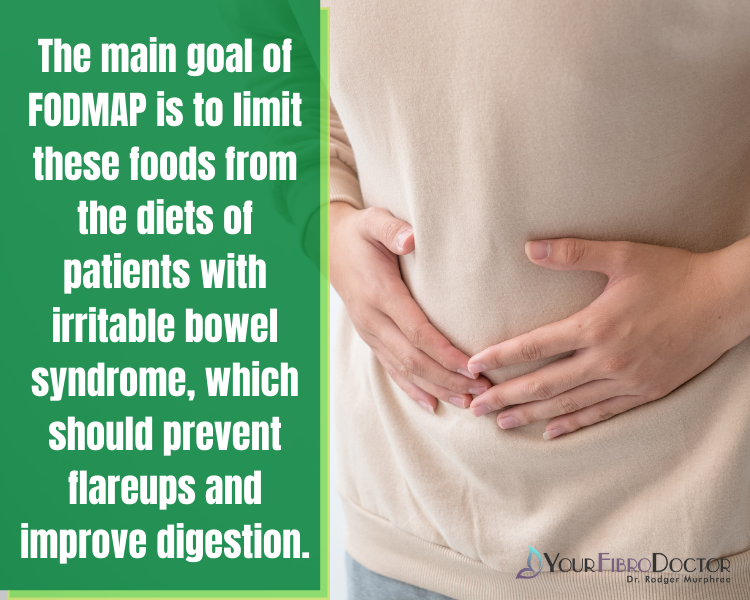
In a 2015 comprehensive systematic review and meta-analysis, researchers analyzed the effects of this diet on thousands of people across more than 30 studies.
The results showed that the low FODMAP diet offers significant benefits to IBS patients, as researchers concluded that “This meta-analysis provides strong evidence to support the efficacy of a low FODMAP diet in reducing functional gastrointestinal symptoms associated with IBS.”
Adding that “The low FODMAP diet resulted in statistically and clinically significant improvements in all functional symptoms; however, the symptom with the least improvement was constipation. Constipation has long been associated with a low fiber intake, and a typical low FODMAP diet can often be lacking in fiber content.”
For this reason, adopting the FODMAP diet while keeping your fiber intake high would be the perfect solution for IBS.
The Benefits of the FODMAP diet
Most studies revolving around the FODMAP diet included people with irritable bowel syndrome. According to various sources, the FODMAP diet could potentially benefit up to 75% of people with IBS.
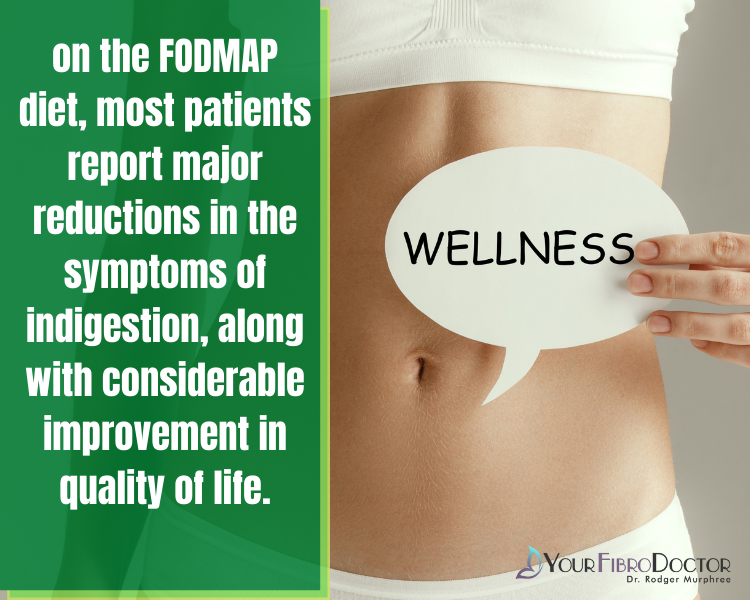
Shortly after adopting the FODMAP diet, you can expect the following benefits:
- Less gas
- Fewer episodes of bloating
- Normal bowel movements
- Improvement of abdominal pain and cramping
Finally, the FODMAP diet may promote mental health by eliminating the annoying digestive symptoms that often trigger feelings of stress and anxiety.
What happens when you eat the FODMAP foods?
The vast majority of FODMAPs travel through the intestines unchanged. In other words, these foods are resistant to the action of digestive enzymes, which is why experts classify them as dietary fiber.
In some individuals, even simple sugars, such as lactose and fructose, act as FODMAPs, which trigger symptoms of indigestion.
Sensitivity to these carbs varies between individuals. For this reason, experts theorize that hypersensitivity to these carbs may be responsible for triggering IBS and other digestive symptoms.
Once FODMAPs reach your colon, gut bacteria ferment and use them as fuel.
While the same process occurs with dietary fiber, which provides us with many health benefits, the bacteria that feed on FODMAPs produce hydrogen, leading to stomach cramping, gas, bloating, pain, and constipation.
Most of these symptoms arise from the mechanical distension of the intestines by hydrogen, which makes your stomach look unusually bigger.
Because FODMAPs also have active osmotic properties, they can also contribute to diarrhea by attracting water into the lumen of the intestines.
In summary, for some, consuming FODMAPs disrupts normal bowel movements, leading to symptoms of poor digestion. Limiting these foods from your diet may help regulate normal bowel movements which is especially beneficial for patients with chronic gastrointestinal symptoms (e.g., IBS patients).
Signs and symptoms addressed by the FODMAP Diet
As we mentioned above, the FODMAP diet addresses various signs and symptoms of indigestion, including:
- Abdominal pain
- Cramping
- Bloating
- Constipation
- Diarrhea
- Gas
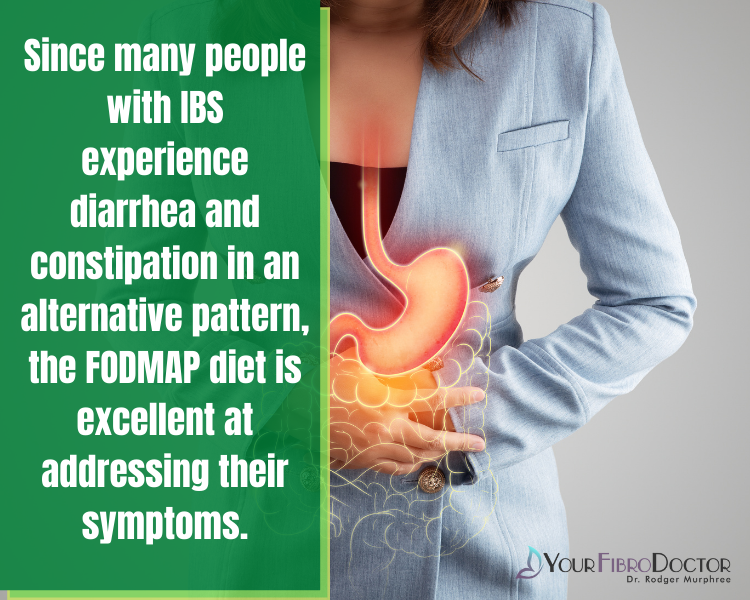
Of course, you should continue to make healthy lifestyle measures, such as exercising on a regular basis and choosing your meals carefully.
The FODMAP diet is an effective way to relieve the symptoms of IBS and improve digestion. Moreover, most experts have a consensus when it comes to the effectiveness of this diet – something you cannot say for most other diets.
Finding the right diet for you can be a challenge. It often requires trial and error.
One diet that has shown to be helpful for most everyone who tries it, is the detox diet.
The Detox diet is a safe easy to follow diet that helps the body rest and repair itself.
–> Make sure you get registered for the FREE Detox Diet Challenge that starts later this month.
If you want to lose weight fast, usually half a pound a day, then check out the diet my patients use at www.2Transformhealth.com

To ensure you’re getting the nutrients you need for optimal cellular health I recommend eating a healthy diet and taking a digestive enzyme with each meal.
Essential Therapeutics Digestive Enzymes – 15% OFF (discount code: AUG21DE)
Step-by-step instructions, presentations, live Q&A sessions and more!
- Easy to follow diet, SAFE, gentle protocols (NO harsh chemicals or supplements, cleanses or purges!).
- By simply changing your diet and adding a couple of inexpensive over the counter supplements (optional), you can dramatically reduce your toxic load.
–> Learn more – Register for FREE HERE
to get information on accessing the FREE Zoom presentation, Q&A’s, handouts, recipes and more!
** If you can’t commit to doing the Detox Diet during the scheduled 2 weeks, simply grab the information and do it at your convenience. **
Register here and get your free registration gifts including, “What You Should Know About Organic Foods” Report




